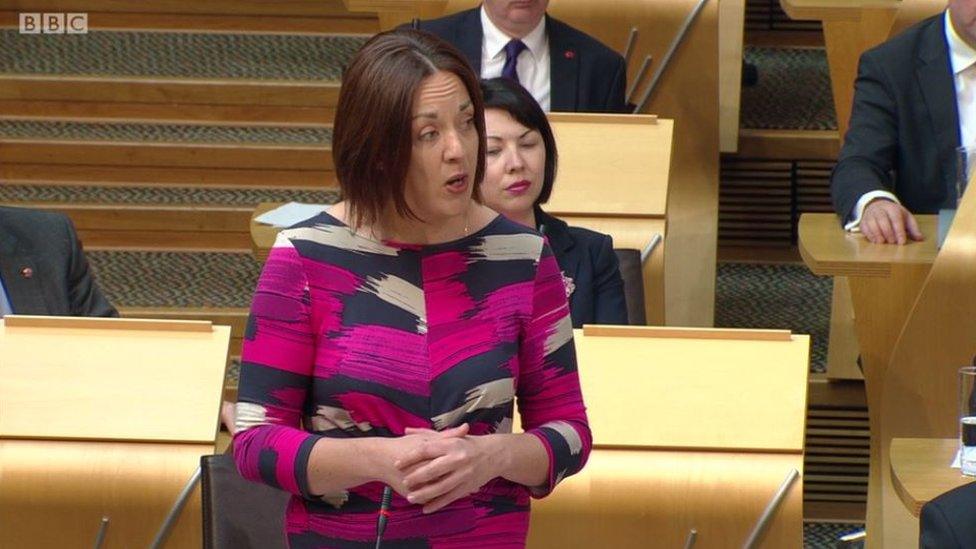FMQs: Holyrood action is left on the dramatic fringe
- Published
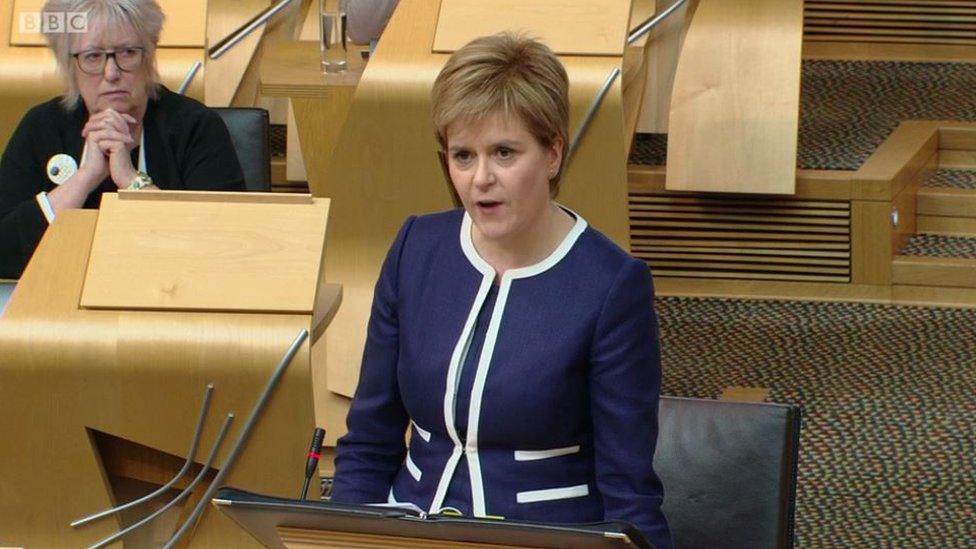
Nicola Sturgeon accused Theresa May of "ducking" a coming leaders debate
If the exchanges at Holyrood today failed to whelm - as they did - then a ready answer can be found. The political focus is entirely now upon the UK general election and, today, upon the UK Conservative manifesto.
Said tome was launched at pretty well the moment when Nicola Sturgeon rose to face her weekly inquisition.
Not that the Holyrood questions were weak or misplaced. Not that the answers were incomplete or insubstantial.
No, it is simply that the poor players strutting and fretting upon the Holyrood stage today were decidedly on the dramatic fringe. And they knew it. Indeed, they seemed to be yearning to be elsewhere, to be on the campaign trail.
In that vein, Nicola Sturgeon opened with a declaration of her imminent departure from the chamber to take part in the ITV Leaders' Debate, concluding with a swipe at the PM who won't be there (Nor will Jeremy Corbyn, in Mrs May's absence).
The subsequent exchanges with Ruth Davidson of the Conservatives were substantive, if formulaic and familiar. The topic? School education in Scotland.
Not, of course, a subject under vote in these UK general elections, being devolved. But the Tories plainly calculate that they can counter SNP attacks on the Conservative record at Westminster by challenging Nicola Sturgeon on her own Holyrood performance.
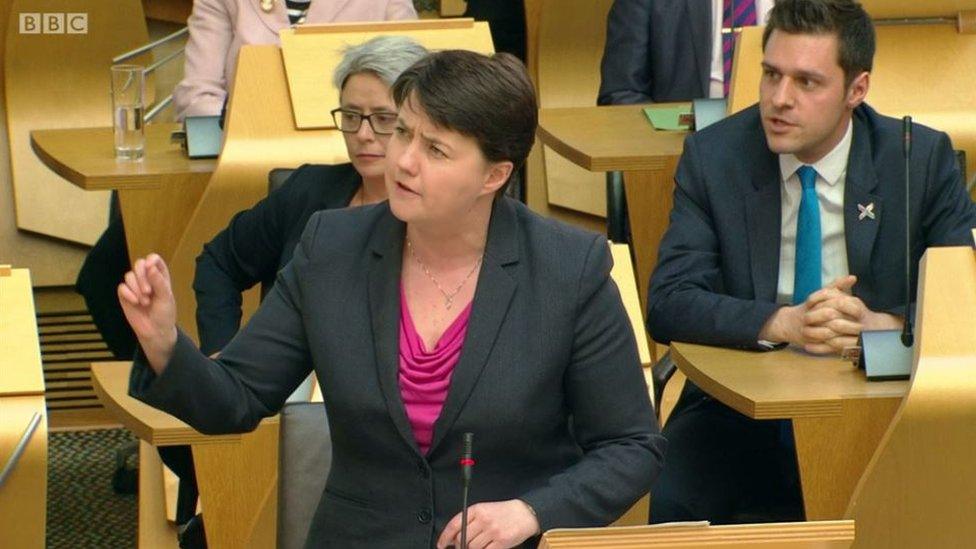
Ruth Davidson raised education for the second week in a row at FMQs
Ms Sturgeon said, more than once, that Ms Davidson was thoroughly entitled to ask searching questions. She slightly spoiled this magnanimous note by then suggesting further that, while speaking was all very fine and dandy, it was action which counted.
Action by Sturgeon, N. Ruth Davidson looked, if not miffed, then less than contented. She accused the FM of waffling.
However, if Ms Sturgeon publicly welcomed the line of questioning pursued by her Tory opponent, she disdained the discourse with Labour's Kezia Dugdale.
Ms Dugdale raised the topic of abuse in social media, challenging the FM to disown the same. Ms Sturgeon duly did, noting that she was no more responsible for comments from folk purporting to be supporters of the SNP / Independence than any other leader was responsible for posts from their quarter of the political field.
Kezia Dugdale persisted, demanding further assurances. At which point, Ms Sturgeon suggested that her opponent was putting up a smokescreen to hide Labour's local difficulties in Aberdeen.
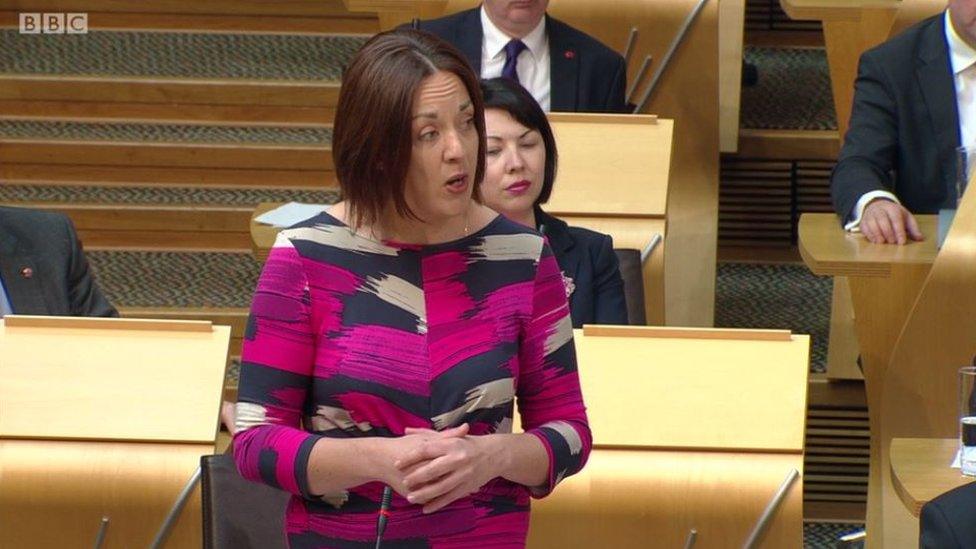
Kezia Dugdale used her questions to raise online abuse
Patrick Harvie of the Greens demanded a complete ban on fox hunting. Ms Sturgeon said the law was under review.
Willie Rennie of the Liberal Democrats raised a topic he has successfully made his own. Mental health, particularly among the young. He demanded action. Ms Sturgeon countered by insisting that action was indeed being taken.
All - or mostly - substantive stuff. But, again, attention was elsewhere. You could catch the note in little, throwaway remarks like the FM's suggestion that the Tories are "morphing into UKIP".
As she spoke, in Halifax, Theresa May was steadfastly denying that she was UKIP manqué or a Red Tory or anything of the sort. Rather, she was a mainstream Conservative, seeking to promote a mainstream agenda.
Annoying the 'grey vote'
As ever, key elements of the offer don't apply directly or immediately to Scotland - although the promised spending on the NHS and education would find its way to Edinburgh via the Barnett Formula.
Equally, the plans affecting the elderly cover issues which are partly devolved. This includes the winter fuel allowance and changes to social care. Pensions, however, are reserved so the plan to amend the triple lock, removing the proviso that there would always be a minimum 2.5 per cent increase, extend north of the Border.
Commonly, it is considered courageous (Copyright: Yes Minister) to do anything that might annoy the "grey vote". The Tories would appear to be calculating that a concept of spreading both gain and pain will appeal. Or they reckon they will have a big enough majority to cope.
The big ideas? A strong, sound economy. Tough bargaining to achieve the best possible Brexit deal. Constraints upon immigration.
As with Labour, the package represents, to some degree, a break from the party's recent past. This election may be, literally, unnecessary in that the PM had a working majority. But it is throwing up some intriguing options.
- Published18 May 2017
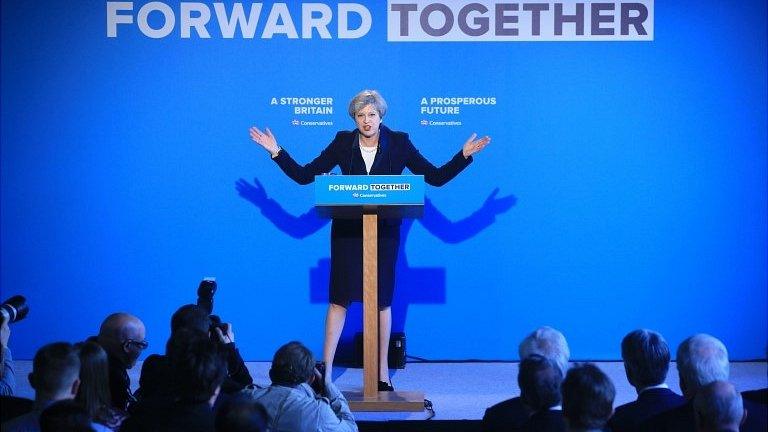
- Published18 May 2017
